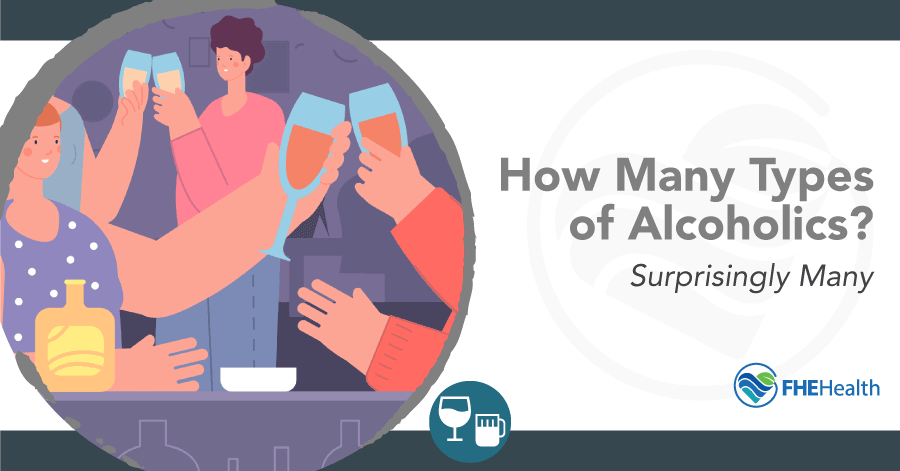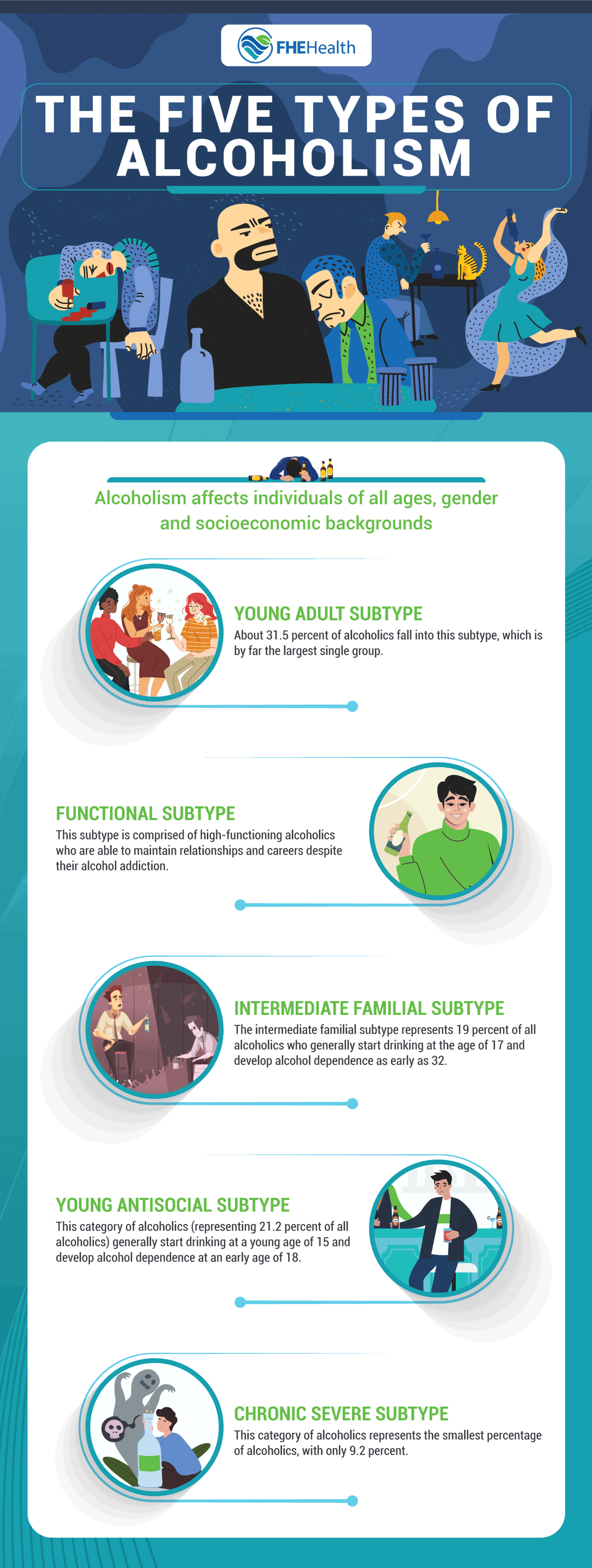
There are many types of alcoholics, depending on the person’s reason for drinking, age and other factors. Learn how to use them to identify problem drinking.
According to a 2021 Gallup study, 60% of adults are alcohol drinkers, and 18% sometimes drink too much. While there are many types of alcoholics, people don’t have to be raging alcoholics to have a drinking problem. We’ll look at the different types of alcoholism and how knowing them may help identify problem drinking.
What Are Some Reasons People Drink?
Among the various models that define types of alcoholics, one focuses on the motives behind drinking to gain a deeper insight into alcohol addiction and understanding an alcoholic. According to this model, people drink because of four main reasons.
Social Drinking
Social drinking is the most common type of alcohol consumption and a significant part of American culture. A social drinker consumes alcohol in various settings, such as homes, restaurants and celebrations, to bond, relax and socialize with others.
This drinking type may not be a problem as long as it doesn’t cause disruptions in personal lives and careers. However, you can start as a social drinker and slowly become an alcoholic without being aware of your problem.
Signs that your social drinking may be alcoholism include:
- You go to social gatherings already drunk
- You don’t know when to stop drinking
- You can’t stop drinking even if you know you should
- You drink by yourself frequently
Drinking to Conform
If you don’t usually drink but have a beer or a glass of wine in front of others because you want to fit in, you’re drinking to conform. These drinkers typically drink less than those who drink for other reasons.
Drinking to Enhance
Some people drink alcohol because it’s exciting and makes them feel alive. They actively seek to get drunk to chase a thrilling sensation and are likely to be adolescent or young adult males with extroverted, aggressive or impulsive personalities. People who drink for enhancement often engage in adolescent binge drinking and other risky behaviors.
Drinking to Cope
Drinking to cope is more commonly found in adolescents and young adults than in other age groups. While enhancement drinkers drink to achieve positive emotions, those who drink to cope do so because they want to avoid negative feelings.
Cope-motivated drinkers use alcohol to escape their problems, such as depression and anxiety. They’re more likely to be female and have low agreeableness, low self-esteem and high neuroticism.
Compared to the previous three types of drinkers, those who drink to cope are more likely to consume more alcohol and consequently suffer from more problems caused by alcohol.
What Are the 5 Types of Alcoholics?
While the above four types of drinkers are categorized based on their reasons for drinking, the National Institute on Alcohol Abuse and Alcoholism classifies alcoholics into five types based on the following factors:
- The age of the drinker
- The age they started drinking
- The age they developed alcohol dependence
- Whether there’s any history of alcoholism in their family
- Whether they have any co-occurring mental health conditions
- Whether they have any other substance abuse disorders
1. Young Adult Subtype
This is the biggest subtype and accounts for 31.5% of alcoholics. Those in this subtype typically start drinking early (19) and develop alcohol dependence early (24). They have a low likelihood of co-occurring mental health conditions and moderate probabilities of other substance abuse disorders.
Group members are more likely to be unmarried college students without full-time jobs and drink less frequently than the other groups but are more prone to binge drinking. They’re mostly male and rarely seek help for their alcoholism, but when they do, they usually turn to 12-step programs.
2. Functional Subtype
This subtype is what’s commonly known as “functional alcoholics.” Accounting for 19.5% of alcoholics, this group is typically middle-aged people (41) who start drinking early (18) but develop alcohol dependence later (37).
They’re 60% male and able to maintain regular jobs and relationships, with the highest education and income among all subtypes.
3. Intermediate Familial Subtype
Accounting for 19% of alcoholics, the intermediate familial subtype begins drinking very young (17) but develops alcohol dependence later (32). This group is 64% male and very likely to have alcoholic immediate family members.
They’re more likely than any other subtype to be employed full-time but have less income than the functional subtype. These drinkers are unlikely to seek help for their alcoholism. However, when they do, they usually opt for self-help groups, private health care providers or detoxification programs.
4. Young Antisocial Subtype
About 21% of alcoholics belong to this subtype. They’re 75% male and start drinking and develop alcohol dependence at the youngest ages among all subtypes — 15 and 18, respectively. They have the lowest education and income of all subtypes.
Members of this group have high rates of antisocial personality and substance abuse disorders, including addictions to cocaine, meth or opioids. They’re also likely to have bipolar disorder, depression or social phobia.
5. Chronic Severe Subtype
This subtype makes up 9% of alcoholics and starts drinking very young (15) but develops alcohol dependence substantially later (29). Members of this group are very likely to have alcoholics in their families, substance abuse disorders and antisocial personality disorder.
This subtype has high rates of divorce, acute alcohol withdrawal (over 80%) and emergency room visits caused by drinking. They drink more frequently than any other group, have the lowest employment rate and are most likely to seek help for their alcoholism (67%). Their preferred treatments include self-help, rehab and detox programs.
The Type 1 Type 2 Model
While the previous model defines five subtypes of alcoholics to offer a fine-grained categorization of alcohol addiction, an alternative model takes a more coarse-grained approach and designates only two types: Type 1 and Type 2.
Type 1 alcoholics:
- Start drinking later in life
- Can be men or women
- Influenced by both genetic and environmental factors
- Avoid harm
- Don’t seek novelty
- Seek social rewards
Type 2 alcoholics:
- Start drinking as adolescents or young adults
- Are mostly sons of male alcoholics
- Influenced weakly by environmental factors
- Don’t avoid harm
- Seek novelty
- Don’t seek social rewards
Help Is Available
While this article isn’t a diagnosis, if you or your loved one fits the criteria of one of the models above, they may need help. FHE Health offers addiction treatment programs for any type of alcoholic and is ready to stand by you every step of your recovery. Call us to take your first step.







